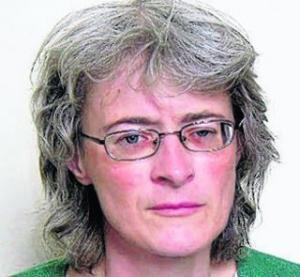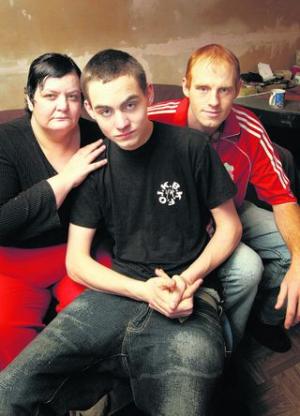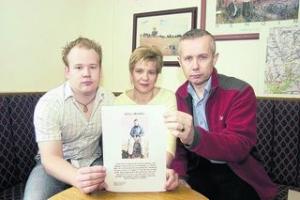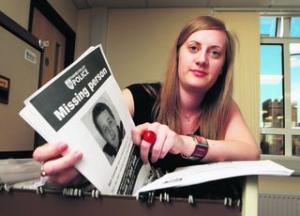 |
| Emma Coats |
 |
| Daniel Becksey after he was reunited
with mum Nicola and stepdad Ross King |
 |
| David and Gill Koch and son David with
a picture of missing son Gareth |
 |
| Thames Valley Police’s missing persons
coordinator Gemma Mitchell |
POLICE attempt to locate 20 missing people a day in Oxfordshire.
So
far this year, 1,181 missing person reports have been received in the
county, the equivalent of seven per day, although this includes repeat
reports and people who disappear several times a year.
Last
year, 2,300 missing persons reports in the county were investigated, the
highest amount of any police area within the Thames Valley.
Oxfordshire’s missing persons coordinator Gemma Mitchell said officers
were generally dealing with about 20 missing people at any one time.
She
said the higher figure for Oxfordshire was due to the large amounts of
vulnerable people here.
She
said: “We have got a lot more institutions like hospitals, hostels and
children’s homes, which have more vulnerable people in them.
“There was one particular homeless male who had been missing for quite a
few months.
“There were no lines of inquiry, but I spent a long time contacting
homeless hostels in London and sending posters out and ringing lots of
different homeless agencies in London, and as a result of someone seeing
one of the posters he was found.
“I
was getting to the point when we were fearing the worst.”
Depression, wanting to escape everyday life or avoid the authorities are
among the reasons why people decide to disappear, although some want to
harm themselves.
But
Miss Mitchell added families were wracked with worry whenever a loved
one went missing.
She
said: “It can be devastating. It’s the not-knowing that tends to plague
people.
“It’s unusual to have a long-term missing person. Cases like
Madeleine
McCann
are extremely rare.
“A
lot of the time, when people turn up they are really sorry for causing
all these problems. They don’t think they would get reported missing.
“If
someone goes missing intent on doing themselves some harm, we have a
duty of care to them and we throw everything at it if we know they are
intending to do themselves harm.”
Miss
Mitchell added: “We can’t do what police officers on the TV do. That’s a
different world, things aren’t as easy as that. A lot of the job is
about managing people’s expectations.
“People think mobile phones are like a satellite beacon and you can
pin-point exactly where they are, but it’s not like that.
“The
case has to fulfil certain criteria before mobile phone companies will
access records. It doesn’t pin-point the area, it just gives an area to
start inquiries.
“It’s difficult with adults. They have a right to look after themselves
and go missing if they want to.
“There is nothing to say police should have access to your phone calls,
NHS details and bank accounts because they are not doing anything
wrong.”
SISTER'S PLEA: THE sister of a 49-year-old woman missing from Oxford’s
Warneford Hospital has appealed for her to get in touch.
Emma
Coats, above, was last seen leaving the hospital at 10am on Wednesday.
Sister Sophie, 44, a yoga teacher, said: “Just call, even if you just
say your name, so we know you’re okay.”
Emma
Coats lives in Sutton Courtenay. Since last year, worries about her
future began to overwhelm her, culminating in her being admitted to the
hospital in March.
Ms
Coats is about 5ft 1in, thin with short, grey hair and wears glasses.
Anyone with information should call
Oxford police on 08458 505505.
DANIEL'S
STORY: OXFORD teenager Daniel Becksey, 17, went missing two
years ago, and his mother still remembers the relief when he was found
safe.
The
Iffley Mead School pupil, who has a mental age of 10, went missing from
his home in Wayneflete Road, Barton, in November 2008.
He
was traced to Reading and found by police three days after going missing
on his way to school.
He
was traced after a lorry driver told police he had given Daniel a lift
to the Berkshire town four hours after he went missing.
The
Becksey family and their friends distributed leaflets, put up flyers and
made appeals on websites to track him down.
His
mother Nicola Becksey, 39, of Burchester Ave-nue, Barton, said she was
in floods of tears when she was told her son had been found.
The
mother-of-four said: “It was dreadful. It was the worst time of my life,
I really believed my son was dead.
“When he was found, it felt like the world had been lifted off my
shoulders.
“There was so much relief when he came home, not just for me but for the
whole family.”
GARETH'S STORY: In March 2004, Gill and David Koch were waiting for son
Gareth to return home to Wantage from a trip to Nepal.
He
vanished without trace and none of his belongings have ever been found.
He was last seen in Nepal with two German travellers in March 2004.
Mr
Koch, who runs the website garethkochlostinnepal.co.uk, said: “It’s very
difficult to keep it fresh in people’s minds, there is no new news and
Nepal is so far away. There hasn’t been anything significant since 2004
and that was the last time he was seen. Since that day there has been no
new confirmed sightings.”
Mr
Koch said Gareth’s passport had expired and there were no records of him
ever applying for a new one.
He
said: “We have come to the conclusion that he is still in Nepal, alive
or dead. Common sense would dictate that something has probably happened
to him but until someone can produce evidence we have hope.”
Miss
Mitchell said: “It’s still open but there are no lines of inquiry. I
have done a review on it but he’s missing in a foreign country. There is
not much we can do. There is going to be very little evidence elsewhere.
I have done the checks to see if anyone is going by that name and there
is no evidence to say that he is in the country.”
PROCEDURE: Missing persons report is made to police Operator takes
details to establish whether the missing person is a high-risk or
vulnerable person House is searched by police looking for clues which
could indicate where the person has gone A photograph of the missing
individual is obtained Inquiries with families and friends begin Wider
inquiries are made by officers at places frequently used by the missing
person.
A
press release is released to the media Further inquiries are made into
mobile phones, bank accounts, and computers. |






